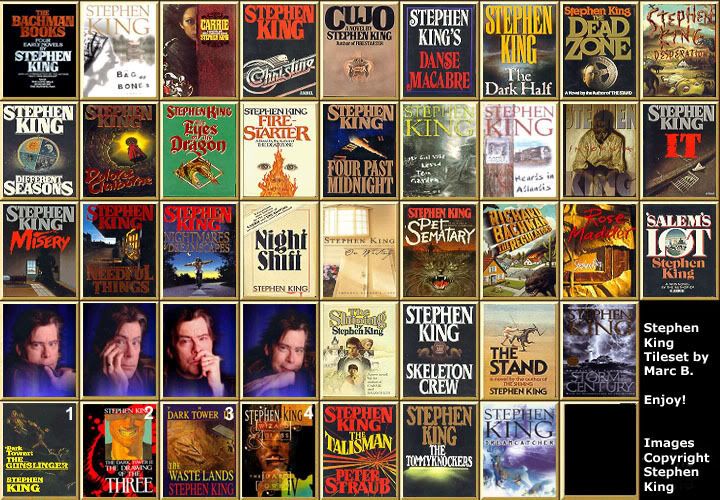Stephen King is easily one of the most prolific and
successful writers of our, or any other, generation. With almost 80 completed works, and no doubt
many more already roughly penned, his talent for producing stories which chill
and excite, terrify and confuse, is inestimable. Many of his books, novels and short stories
have made their way onto the big and small screen. Where film and TV adaptations do not always
work, however, is in the portrayal of the central characters.
(can you call it a
tool? sure...)
is the use of indented thought, interrupting the text within brackets. Often, the narrative is interrupted by a
character’s attempts to justify their own modus operandi, and their actions, in
such a way that we truly get
them. We can either like them or loathe
them, but it is due to this device, rather than broad strokes with either a ‘good’
or ‘bad’ brush. Short of using first
person narrative, a tool rarely used in cinema as it can be distracting and
frustrating, there is no way to get this across to the viewer.
Another key character, in every one of King’s tales, is the
location itself. This creation of back
story, of specific locale, is one of the most important features of his
writing. Castle Rock, Derry and the
outlying provincial towns are the specific location of almost every one of
these stories, and as such, as we progress through them, it is impossible not
to visualise King’s Bangor, Maine, as a true place, where each of these
characters, with all of their baggage and issues, live each day of their lives,
waiting for the ‘next big thing’ to happen.
People say that they prefer films to books – as an English
teacher, this disgusts me to my core, but as a fan of Stephen King, it is even
more fundamentally shocking. Whilst his
writing can be challenging, there is little that can be more rewarding than ploughing
through one of his epics, like The Stand or
Under the Dome, or indeed the entire Dark Tower series, and feeling the
characters, the texts, the events come to life in your own mind’s eye.
Much of King’s genius stems from the fact that he is able to
write such cleverly interconnected tales.
He spins delicate webs which one cannot help but get caught in, and
then, much later on, revisits these strands, these characters. A murderer from one novel is the ‘boogeyman’
story told to terrify children in another.
An incident involving a malevolent creature in one book reappears,
however fleetingly, in another, as the graffiti ‘Pennywise Lives’ is seen. Never has his work been more meta-textual,
however, than in the Dark Tower books,
where, over seven epic novels, numerous characters, events and places are
revisited, even including an author by the name of Stephen King trying to
figure out the ending to a story, as the power of the Dark Tower forces King to
complete its tale.
 So, that’s my justification for this mission of mine. His work has influenced my life for nearly 2
decades, and I have read everything he has ever written, as and when I could
get my hands on it – some, grubby second-hand copies, smelling of stale tobacco
and arriving by air mail from America.
Others, like my newest additions, pristine, un-thumbed, until I buried
my head into them and devoured every word.
So, that’s my justification for this mission of mine. His work has influenced my life for nearly 2
decades, and I have read everything he has ever written, as and when I could
get my hands on it – some, grubby second-hand copies, smelling of stale tobacco
and arriving by air mail from America.
Others, like my newest additions, pristine, un-thumbed, until I buried
my head into them and devoured every word.
To start from the very beginning – from Carrie, no less – through to his latest release – 11/22/63 at the time of writing, but two
books due for release very soon, including a sequel to The Shining and a story set in a theme park – and trace the way in
which his genius has grown, his style has matured, and his references have
become more and more relevant as he adds to his bibliography, is a challenge
which I cannot wait to embrace.

No comments:
Post a Comment